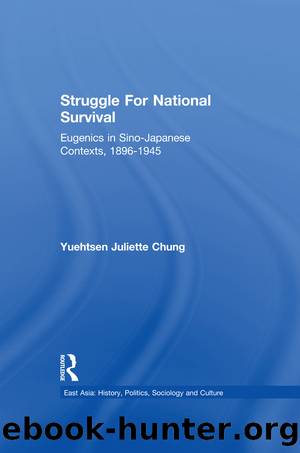Struggle For National Survival by Yuehtsen Juliette Chung

Author:Yuehtsen Juliette Chung [Chung, Yuehtsen Juliette]
Language: eng
Format: epub
Tags: Social Science, Reference
ISBN: 9780415933667
Google: afifh-RjCFgC
Publisher: Psychology Press
Published: 2002-01-15T03:40:11+00:00
Concluding Remarks
The role of Lamarckism as a cultural logic playing in the Japanese context helped provide an analogous extension from the individual body to a greater national/racial body, in that undesirable elements were justifiably removable for the sake of the wellbeing and health of zentai (totality or literally the body as a whole). The irony implied herein was the removal of leftist socialism, like the eradication of leprosy, by the rightist socialists on the basis of the same Lamarckian emphasis. Hence, the mind in the zentai body, manifested as the state operating in the nation, became a homogenizing unity to coordinate harmoniously on everybodyâs part. In comparison, the Mendelian approach in Chinese eugenics was not only vilified by socialists of both the left and right, but also was transformed and succumbed to the concern of generational transmission in the Chinese cultural body. The shift of attention directed Chinese eugenics down the route of cultural renaissance and rejuvenation, rather than the route to eugenics bills legislation.
In the Japanese eugenics journal Yûseigaku, a 1936 Japanese travel note from North China, before the outbreak of the second Sino-Japanese war, reported that the Chinese eugenics movement was encountering a hopeless impasse, because the Chinese society was sick in the midst of fierce turmoil. There was no strong and critical middle class in Chinese society to defend the benefit of the majority. The elite followed mechanically what they learned from their overseas education, mainly from Britain and America, without relating the knowledge to the reality of peopleâs benefit. The report went on to say that without integration and order, the society was not able to define or design the desirable type of human being in order to examine and therefore differentiate the good from the inferior elements in every individualâs physical and mental qualities.85 This report flashed historical insight on the outcomes of debates in both the Japanese and the Chinese eugenics movements: whereas the Japanese had achieved and exhibited efficiency in the unity of mind and body, the Chinese were debating how to put together a healthy cultural body, with the function of its mind still in question.
The historical excavation of these two processes of scientific debate not only sheds light on the social forces in action in Japan and China, but also alerts us to the politics of scientific interpretation which is often involved in the struggle over meaning and values. The politics of eugenics was not a mere conservative or rightist phenomenon. What had been said in the various debates should not be stigmatized as a whole by its historical outcome, and be buried in oblivion. The debates are instead the discursive resources to tackle present and future problems.
Download
This site does not store any files on its server. We only index and link to content provided by other sites. Please contact the content providers to delete copyright contents if any and email us, we'll remove relevant links or contents immediately.
Cecilia; Or, Memoirs of an Heiress — Volume 1 by Fanny Burney(32538)
Cecilia; Or, Memoirs of an Heiress — Volume 2 by Fanny Burney(31935)
Cecilia; Or, Memoirs of an Heiress — Volume 3 by Fanny Burney(31925)
The Great Music City by Andrea Baker(31911)
We're Going to Need More Wine by Gabrielle Union(19032)
All the Missing Girls by Megan Miranda(15927)
Pimp by Iceberg Slim(14476)
Bombshells: Glamour Girls of a Lifetime by Sullivan Steve(14046)
For the Love of Europe by Rick Steves(13870)
Talking to Strangers by Malcolm Gladwell(13341)
Norse Mythology by Gaiman Neil(13332)
Fifty Shades Freed by E L James(13228)
Mindhunter: Inside the FBI's Elite Serial Crime Unit by John E. Douglas & Mark Olshaker(9313)
Crazy Rich Asians by Kevin Kwan(9271)
The Lost Art of Listening by Michael P. Nichols(7487)
Enlightenment Now: The Case for Reason, Science, Humanism, and Progress by Steven Pinker(7303)
The Four Agreements by Don Miguel Ruiz(6739)
Bad Blood by John Carreyrou(6609)
Weapons of Math Destruction by Cathy O'Neil(6261)
